| Music Trade Review |
|
Die Zeitschrift Music Trade Review ist online verfügbar: |
|
Music Trade Review - Music
Industry Magazine
Online Library: 1880 - 1933, 1940-1954 The Music Trade Review was published out of New York from 1878 until at least 1956. It apparently suspended publication with the January 1933 issue. Publication was resumed under different management sometime between 1937 and 1940. Our online library contains issues from 1880 to 1933, and from 1940 to 1954. Additional years are available for review at a number of libraries. Search www.worldcat.org for more information about the holdings of other libraries, or ask your local librarian for assistance. |
| |
| --
google Anzeige -- |
| Bitte
teilen sie diese Seite: |
|
Dave Appollon and His Manila Orchestra on R. K. O. |
Fretted InstrumentsTHEIR ORIGIN, DEVELOPMENT and MARKETINGForth of a Series of Articles on Fretted InstrumentsBy LLOYD LOAR When a
musical instrument is purchased for or by a beginning student of music
there is pretty sure to be back of that purchase one of two incentives,
or, perhaps, a mingling of both. One is the desire to acquire an
accomplishment, the other a plan to prepare for a profession. Other
considerations, of course, enter into the actual purchase of a specific
instrument, but one or both of these basic incentives has brought about
the decision to purchase some sort of a musical instrument, and these
other considerations do not begin to function until afterwards. Perhaps the most important function of music is that of its educational value. Music study is a brain developer of the first order, and, in addition, it prepares for the business of living in a way that no other study can. An intelligent appreciation of music is a permanent benediction to life that never loses its potency, no matter what vicissitudes may assail the development of that life. Such an appreciation is always ready to contribute a keen wholesome enjoyment, an inspirational, refreshing, mental and physical tonic, that has no unfavorable reaction; and it increases in its power to respond effectively to the stimulus of music with use, instead of wearing out and bringing satiety. It is this phase oijSmusic study that makes so logical and valuable the program of extensive music instruction, now under way in our public school system. For the best way to acquire an appreciation of music is the actual study of it through the medium of a musical instrument. It is true that there are many who have a very active appreciation of music who have never studied it, and who arc unable to play any instrument, but it is equally true that their appreciation would be much keener if they knew more about it. Music is more than a succession of pleasing sounds; some understanding of form, melody building, development, harmonic progression, and numerous other kindred details, are necessary if one is to have any idea as to what the composer is trying to do, and how well he does it. Surely no one would suggest that it would be possible to develop an intelligent appreciation of literature without being able to read, no matter how numerous the opportunities to hear others do so. And the process of developing an adequate music appreciation is just as handicapped unless one has studied some instrument and acquired in that way a general but correct knowledge of the many details that make up a reasonably adequate appreciation of music. The purchaser who is interested in this important contribution that music makes to life is overlooking his best interests if due consideration is not given to fretted instruments. Any normal person can acquire an individually sufficient appreciation of music; it may not be as keen as that developed by the exceptional person, but it will be in proportion to his appreciations of the other things that make life. On the other hand every normal person cannot learn to play the piano or the violin reasonably well, but they can learn to play one of the fretted instruments quite well. In other words, the same amount of time devoted to study will advance the student farther on a fretted instrument than it will on the piano or violin. It must not be supposed that we are preparing the way for an advocacy of fretted instruments as the sole medium for developing music appreciation; that would be foolish indeed. The violin family and the piano and their invaluable literature mean so much to music that if they should suddenly disappear the loss to music in general would be incalculable. It is a mistake to consider the fretted instruments as rivals of the bowed instrument family or vice versa, although that has too often been the custom of players of both. The musical value of an instrument should be determined by the contribution it can make to each phase of music activity, and in the consideration of a means of approach to music appreciation, especially for beginning children, the fretted instruments must be given a high rank. Many a child has struggled futilely with the violin or piano only to give it up after a time, carrying with them the rest of their life a vague antipathy to music—for no one is very enthusiastic about anything at which they have failed. Whereas, if they had been started on a fretted instrument, they could have undoubtedly learned to play it well enough to derive considerable satisfaction from it, and to have made the other instruments much easier to learn if they had been inclined to transfer to one of them later on. No matter how far or how high a musicstudent may be able to go, what they may have learned in their beginning days is never wasted. Fretted instruments are an ideal approach to the violin family, so much so that one year on the mandolin and one on the violin is worth, to the average beginner, as much as three years on the violin. If we can be pardoned a personal experience, the writer started out as a mandola, or tenor-mandolin player. After a good many years, and some success, on that instrument, he decided to add the viola to his artillery. Without any previous experience of bowed instruments, and with only a few months' practice, he was able to play the viola well enough to use it in professional concert work as a solo instrument, and to take a satisfactory part in a chamber-music ensemble. The reason for this is logical enough. More than any other, a fretted instrument separates the various things necessary to do in learning to play upon an instrument; and it is always easier to learn to do a half-dozen things at one time than all at once. We repeat it once more, fretted instruments furnish an ideal introduction to music. They are easier to learn than any other instrument, the student unable to accomplish much with a so-called standard instrument can still do enough with a fretted instrument to give himself and his friends considerable pleasure, and he can provide a basis for music appreciation that he would not otherwise have. If he shows the necessary talent, has the time and funds, to extend his activity to some other instrument, he is farther along in a little while than if he had started with his last choice, and he can play two instruments instead of one. The other considerations suggested should not be lost sight of. The buyer gets better value for his money in fretted instruments than in other types; a small sum will buy a very good one, a larger proportionate value than the same sum will buy in other instruments. Then these instruments are sturdier, and less temperamental than other small instruments. They are also, to a large extent, independent, not dependent so much on an accompanying instrument to complete the harmonic and rhythmic pattern while furnishing the melody. In addition they can furnish an effective accompaniment themselves for other instruments or the voice. They are, because of these characteristics, ideal for vacation trips, school and college life, and informal gatherings. They also can furnish to many who would not otherwise have it the musical and social pleasure there is in ensemble playing. As a profession they have as much to offer as any other type of instrument. There may not be as many professional musicians who feature these instruments, but the ones who do are, for the most part, very successful, and this would indicate that there is room for more of them instead of the contrary. Symphony and opera orchestras do not generally include them; they will some day, and they cannot until there is a supply of technically adequate players. Then the modern small concert orcheslra, that is an outgrowth of the jazz dance orchestra, includes one or more tenor banjos, and the possibilities of that instrument as an orchestral and solo instrument have hardly been touched. Teaching, selling, directing—they all offer many possibilities to the fretted instrument specialist. Everything considered, these instruments deserve attention, interest, favorable consideration, and, in the majority of cases, positive action on the part of purchasers of musical instruments. 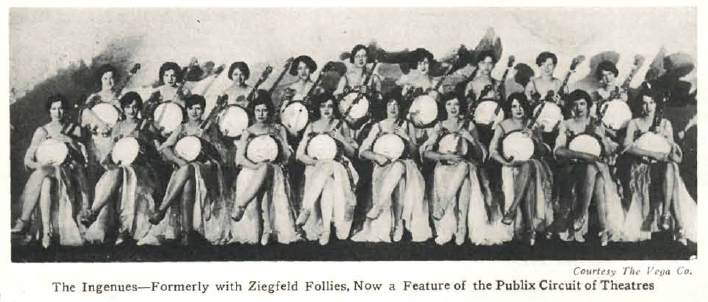 The Ingenues—Formerly with Ziegfeld Follies, Now a Feature of the Publix Circuit of TheatresSource: http://mtr.arcade-museum.com/MTR-1930-89-4/39/ http://mtr.arcade-museum.com/MTR-1930-89-4/43/ |
B & D "Silver Bell" Creation - The Sultana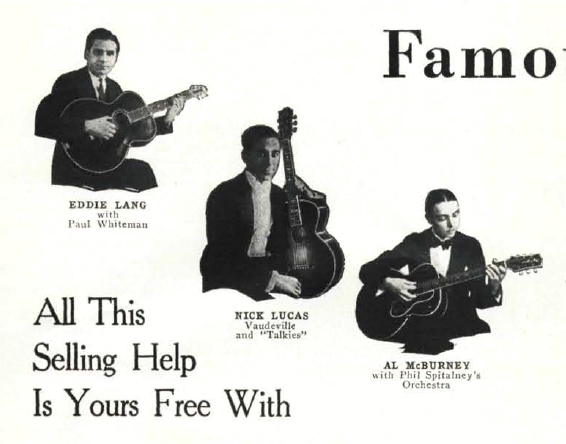 Eddie Lang with Paul WhitemanNick Lucas Vaudeville and "Talkies"Al McBurney with Phil Spitalney's Orchestra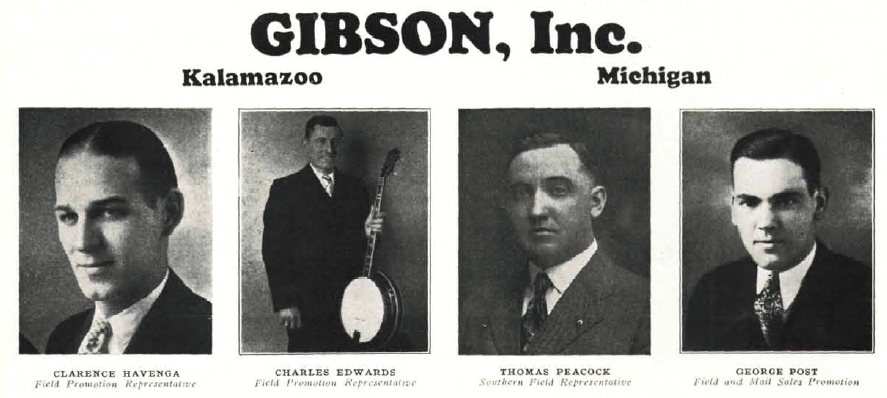 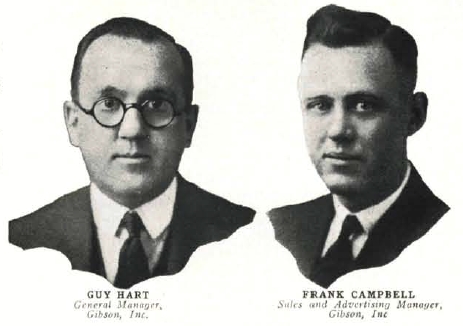 GUY HARTGeneral Manager Gibson, Inc. FRANK CAMPBELLSales end Advertising Manager, Gibson, Inc. Source: http://mtr.arcade-museum.com/MTR-1930-89-4/39/ http://mtr.arcade-museum.com/MTR-1930-89-4/40/ |
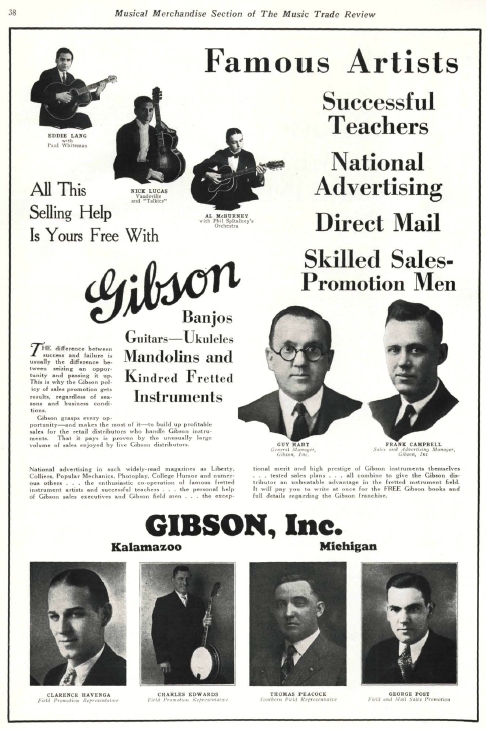 Gibson Banjos, Guitars—Ukuleles Mandolins and Kindred Fretted InstrumentsThe difference between success and failure is usually the difference between seizing an opportunity and passing it up. This is why the Gibson policy of sales promotion gets results, regardless of seasons and business conditions. Gibson grasps every opportunity and makes the most of it to build up profitable sales for the retail distributors who handle Gibson instruments. That it pays is proven by the unusually large volume of sales enjoyed by live Gibson distributors. National advertising in such widely-read magazines as Liberty, Colliers, Popular Mechanics, Photoplay, College Humor and numerous others . . . the enthusiastic co-operation of famous fretted instrument artists and successful teachers . . . the personal help of Gibson sales executives and Gibson field men . . . the exceptional merit and high prestige of Gibson instruments themselves . . . tested sales plans . . . all combine to give the Gibson distributor an unbeatable advantage in the fretted instrument field. It will pay you to write at once for the FREE Gibson books and full details regarding the Gibson franchise. |
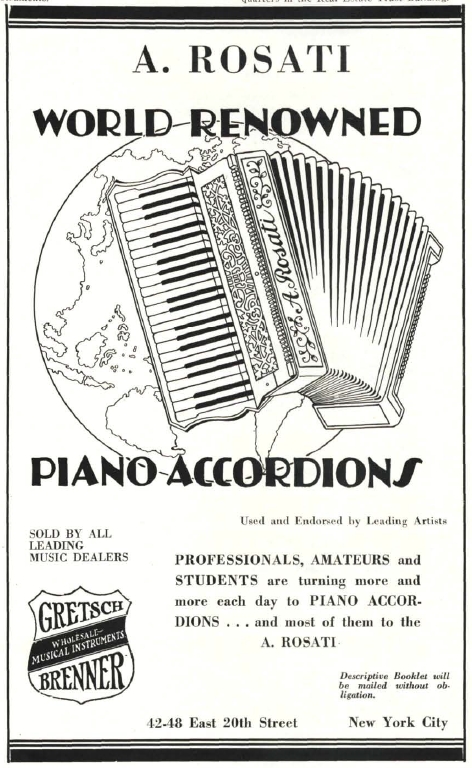 A Rosati Piano Accordion |
>>> Zurück zum Inhalt - Back to the Contents <<< |
| Wenn
sie diese Seite
ohne Navigationsleiste angezeigt bekommen, dann klicken sie hier um die MandoIsland Homepage zu öffen: |
 |